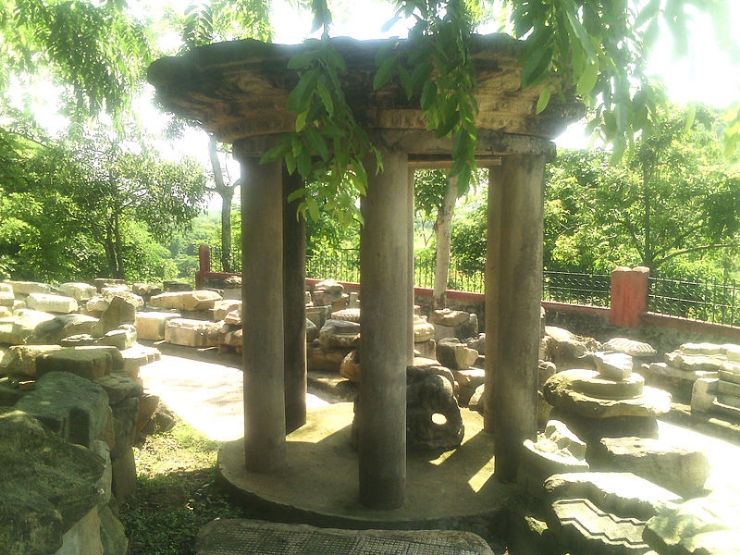1203 A.D, a horde of vandals led by Bakhtiyar Khilji perpetrated irreparable damages to the Nation Society. The sacking of Vikramshila and destruction of Nalanda University marked the inception of millennia-long suffering and destruction. These practitioners of Anti-Diversitism excelled in the potential of inflicting terror and rapine in dimensions previously known to the Diverse society of this Nation.

(Ruins of the ancient Kamrupa Kingdom at Madan Kamdev)
Kingdoms, one after another, fell to the terror tactics of these invading hordes. The Sena dynasty fell to an ashaming number of handful invaders and was incapable of putting up a decent fight. The eighty-year-old Lakshman Sena fled his kingdom to be pillaged and dishonoured by Khiljis. Hope was lost, but not entirely, the ancient land of Kamrupa was still unconquered and was being valiantly ruled by Raja Prithu or Prithu Rae, as mentioned in Tabakat-I-Nasiri (A General History of the Mohammedan Dynasties of Asia, including Hindustan, translated by Major H.G Raverty). With a bloated ego and guided by a desire to destroy every Last kingdom of the Nation Society, Muhamad Bin Bakhtiyar Khilji invaded Kamrup to continue the destruction and rapine.
Nevertheless, little did he know, the fate that was about to befall on him. The Witty and the valiant Prithu Rae not only defeated the Khilji army but humiliated it to the extent that Bakhtiya Khilji although survived the onslaught, could never recover from the humiliation. Finally, bedridden with Grief and shame, the invader died a silent death at Gaud in 1206.
(Kanai Baraxiboa rock inscription: In Saka 1127 on the thirteenth of the month of honey (Chaitra) upon arriving in Kamarupa, the Turks perished)
However, true to their persistent propensities, they came back again, once in 1227 AD under Husamuddin Iwaz Khalji and again in 1257 under Mughisuddin Yuzbak. Yuzbak, the then governor of Bengal led an expedition into Kamrup in an attempt to restore the invader's pride but suffered a more horrific fate than that of the Khilji’s. The vast green pastures and fertile lands mostly remained undefeated. Later, the Great Ahom kings thwarted similar attempts by the Mughals for seventeen times. These repeated victories achieved by the consecutive rulers of the region not only saved their subjects but also kept the entire area of southeast Asia from falling to the hands of a rapacious horde of invaders.
The Nation society is slowly yet steadily arriving from the deep slumber of ignorance and realising such events in the history of National pride. The Nation society must come together and employ coordinated attempts to take the story of Raja Prithu to the National stage. We need to create the corpus of our National History that can provide an in-depth insight into our roots and present us with real events of our National history capable of enthusing us with courage and vindication. Subsequently, we need more research and voluntary work guided by a zeal to rediscover our glorious past while establishing the need to preserve several ancient sites of the old and medieval history scattered across the region.
I call upon my Nation society to begin our effort in re-establishing our glorious past. Hence, by commemorating 27th March (Chaitra 13, 1127 Saka), the day according to our modern calendar, when Prithu Rae triumphed over the Asuric forces of Bakhtiyar Khilji as Prithu Divas, we can render him the rightful place in our shared socio-cultural history. Thus, creating the necessary curiosity quotient required to reignite our quest to reawaken our ancient heritages.
 (Ruins of the ancient Kamrupa Kingdom at Madan Kamdev)
(Ruins of the ancient Kamrupa Kingdom at Madan Kamdev)